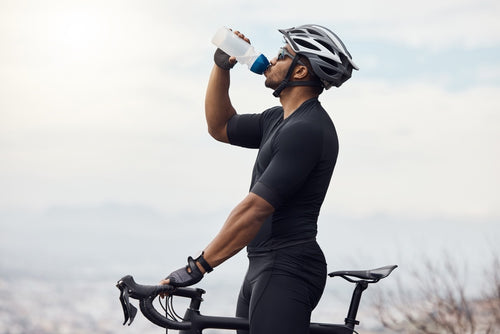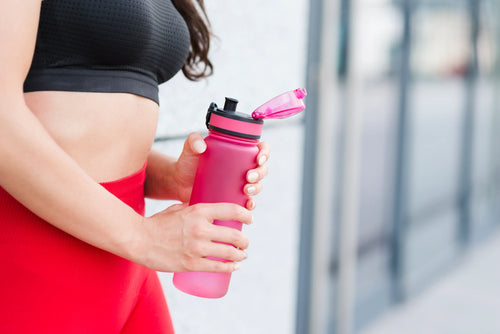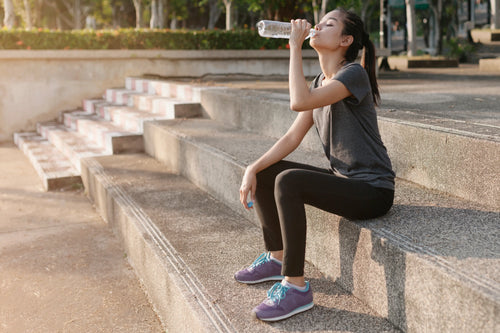When it comes to optimal athletic performance, hydration is only part of the equation. Athletes also need a balanced intake of electrolytes to stay energised, maintain muscle function, and prevent fatigue.
Electrolytes play a critical role in athletic performance, and drinking water alone often isn’t enough. That’s where electrolyte drinks come in. Here are 7 ways electrolytes are essential for athletes and how the right electrolyte drink can make all the difference.
Electrolytes like sodium, potassium, and chloride help balance fluid levels by ensuring that water is distributed throughout the body’s cells and tissues. Without adequate electrolytes, athletes can quickly experience dehydration, detrimentally affecting their performance.
When an athlete sweats, they lose these key electrolytes, increasing the risk of cramps and spasms. Electrolyte drinks can help quickly replenish these minerals, reducing the likelihood of painful cramps during training or competition.²
When taken before exercise, Cellular Hydration™ has been shown to reduce lactase dehydrogenase (LDH) and creatine kinase (CK), two common markers of fatigue, by 92% and 64% respectively. Similarly, Cellular Hydration™ taken post-workout also demonstrated a similar effect, reducing LDH and CK by 83% and 80% respectively.⁵
Experience these effects for yourself right now—explore the full Cellular Hydration™ range at our official e-store.
Electrolytes play a critical role in athletic performance, and drinking water alone often isn’t enough. That’s where electrolyte drinks come in. Here are 7 ways electrolytes are essential for athletes and how the right electrolyte drink can make all the difference.
1. Electrolytes Regulate Fluid Balance
Maintaining proper hydration is essential for any athlete, as even a slight amount of dehydration can impact performance. Research has shown that losing just 2.5% of body weight through dehydration can reduce the capacity to perform high-intensity exercise by 45%!¹Electrolytes like sodium, potassium, and chloride help balance fluid levels by ensuring that water is distributed throughout the body’s cells and tissues. Without adequate electrolytes, athletes can quickly experience dehydration, detrimentally affecting their performance.
2. Prevent Muscle Cramps
Muscle cramps are a common issue for athletes, often due to a deficiency in electrolytes. Sodium, potassium, and magnesium are crucial for proper muscle contraction and relaxation.When an athlete sweats, they lose these key electrolytes, increasing the risk of cramps and spasms. Electrolyte drinks can help quickly replenish these minerals, reducing the likelihood of painful cramps during training or competition.²
3. Boost Athletic Endurance
Electrolytes are essential for energy production and endurance. When electrolyte levels are low, the body can struggle to maintain prolonged activity, causing athletes to “hit the wall” faster. Replenishing electrolytes throughout a workout or event—especially in long-distance running, cycling, or endurance sports—ensures sustained energy levels and helps athletes push through demanding activities.4. Maintain Optimal Performance in Heat
Intense physical activity, particularly in hot weather, can result in excessive sweating and significant electrolyte loss. Dehydration and low electrolyte levels can lead to heat exhaustion or heat stroke, conditions that are serious and potentially life-threatening. Athletes participating in high-temperature environments can hence benefit from electrolyte drinks that replace lost minerals and help the body regulate temperature more effectively.5. Support Brain Function and Focus
Electrolytes like potassium are critical for nerve transmission, enabling clear communication between the brain and muscles.³ When these electrolytes are imbalanced, athletes may experience slower reflexes, brain fog, or difficulty focusing. Electrolyte drinks help keep the nervous system functioning optimally, which is essential for maintaining mental sharpness and reaction time during sports.6. Prevent Fatigue and Muscle Weakness
Magnesium is a key electrolyte involved in muscle function and overall energy production. Low levels of this mineral can lead to muscle weakness and early fatigue.⁴ By drinking electrolyte-rich drinks, athletes can keep their magnesium levels stable, supporting muscular strength and helping delay the onset of fatigue.7. Speed Up Recovery Post-Workout
After intense physical exertion, the body needs to replenish both fluids and electrolytes lost through sweat. Rehydrating with water alone doesn’t fully address this mineral loss, which can slow recovery and increase soreness. Electrolyte drinks provide a quick and efficient way to restore these minerals, supporting faster recovery and preparing the body for the next workout or competition.Cellular Hydration™: Electrolyte-Rich Hydration Tailored for Athletes
For athletes who want to ensure that all their electrolyte needs are met, Cellular Hydration™ represents an effective solution perfect for consumption before or after working out. Each can of Cellular Hydration™ contains an optimised blend of calcium, magnesium, chloride, potassium, and taurine, all delivered in forms ideal for rapid absorption.When taken before exercise, Cellular Hydration™ has been shown to reduce lactase dehydrogenase (LDH) and creatine kinase (CK), two common markers of fatigue, by 92% and 64% respectively. Similarly, Cellular Hydration™ taken post-workout also demonstrated a similar effect, reducing LDH and CK by 83% and 80% respectively.⁵
Experience these effects for yourself right now—explore the full Cellular Hydration™ range at our official e-store.
References
¹Jeukendrup, A., Gleeson, Michael. (2009). Sport Nutrition – 2nd Edition. Human Kinetics.
²Lau, W. Y., Kato, H., & Nosaka, K. (2019). Water intake after dehydration makes muscles more susceptible to cramp but electrolytes reverse that effect. BMJ open sport & exercise medicine, 5(1), e000478.
³Boërio, D., Bostock, H., Spescha, R., & Z'Graggen, W. J. (2014). Potassium and the excitability properties of normal human motor axons in vivo. PloS one, 9(6), e98262.
⁴Córdova, A., Mielgo-Ayuso, J., Roche, E., Caballero-García, A., & Fernandez-Lázaro, D. (2019). Impact of Magnesium Supplementation in Muscle Damage of Professional Cyclists Competing in a Stage Race. Nutrients, 11(8), 1927.
⁵Based on third-party testing by Denova Sciences.



